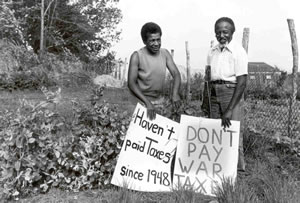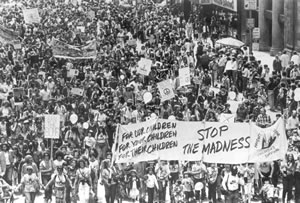History
June 1981: Peace Development Fund is established
In the 1980s: PDF funds groups in the US connected to Central American groups working on peace and human rights.
February 1982: 1st funding cycle awards grants to 19 projects, grants ranged from $500 -$3000

1982: PDF recognizes the importance of training for grassroots groups and funds a series of fundraising training workshops through the Fundraising Training Project, San Francisco, CA.
1983: Pacific Peace Fund (PPF) opens in Seattle, Washington as an affiliate foundation of PDF. PPF is an autonomous foundation but works closely with PDF, sharing board members and funding dockets.
January 1984: PDF and PPF complete their first joint grant cycle. The Pacific Peace Fund would later merge with PDF. In 1996, the Seattle office would be closed as staff retire and move on to other work. All PDF functions are shifted to the Amherst office.
1984: PDF establishes The Exchange Project to provide vital training to grassroots groups. Over the years of its existence (1984–2001) The Exchange Project trained over 1100 groups (more than 3500 people) and provided vital trainings in such areas as Fundraising (Kim Klein was the featured trainer in the 1st Fundraising workshop), Organizational Development, Strategic Planning, Dismantling Racism and other skills development areas. Even today, past participants continue to praise the training that they received as a result of The Exchange Project.
1986: PDF supports The Great Peace March for Global Disarmament on its march across the United States. As one of the 1st groups to come to the rescue of the march, PDF later receives $50,000 from The Great Peace March after it completes its work and dissolves as an organization. In 2005, PDF donates a large collection of Great Peace March papers, stored by that organization with PDF, to the Swarthmore College Peace Collection, Swarthmore, Pennsylvania—the holder of other Great Peace March papers.
1986: PDF moves into it new office space at 44 N. Prospect Street, Amherst, MA, the office space that it continues to occupy.
1987: PDF and PPF establish the Teaching Peace Grants program to fund projects working with children and young people. In 1995, the program would become known as the Youth Program. This program gave out over $800,000 in grants.
1987–88: PDF establishes the Grants Assistance Program to help non-501(c)(3) groups to raise funds. This program will later evolve into the Fiscal Sponsorship Program. Forty-one groups have participated in this program to date (as of June 2006) and they have received over $1.7 million dollars in grants through their fiscal sponsorship status with PDF.
1991: PDF establishes special Persian Gulf War Fund to give immediate support to Gulf War related activism.

1992–95: PDF collaborates with the Center for Economic Conversion (CEC) and the National Commission on Economic Conversion and Disarmament (ECD) on the Conversion Leadership Project (CLP). The CLP was designed to assist selected model grassroots conversion projects through financial support and technical assistance in both conversion strategies and organizational development. The CLP’s overarching objectives were to enhance significantly the effectiveness of conversion activities in achieving local and regional conversion of military economies to productive civilian activities and to promote demilitarization of our nation’s foreign and domestic policies. Over $600,000 in grants plus training was provided to the participants in this program.
1995: A broad based coalition of young donors and staff from other nonprofits—including PDF—establish the Comfort Zone to organize young people of wealth. The Comfort Zone later became a separate entity and is now known as Resource Generation.
1997–98: PDF conducts The Listening Project to bring the voices of the grassroots into creating effective strategies for PDF’s funding and training.
1998: PDF establishes the Community Media Organizing Campaign project, a project that had its start in the Sustainable Communities Project. Working with the Organizing Cooperative in the Southern United States, this project provided intensive media training and support for media campaigns to a select group of grassroots organizations—selected collaboratively by PDF and the Organizing Cooperative. Each year, participating groups, would come together for an annual gathering to share learning’s, attend workshops, and network with other PDF grantees. Following the end of the PDF program, the Organizing Project continued the work of the Community Media Organizing Project amongst its membership. In 2005 the Community Media Organizing Project becomes an independent project and continues today to launch new media strategies to continue to build media capacity for community organizing groups in the South.
2000–01: The Cross-Border Program becomes the 1st project of the new Capacity Building Program. Looking at the history of PDF, one can see that PDF has been about the concept of Capacity Building since 1982 when it decided to support a series of fundraising workshops for grassroots peace groups. Since that time, PDF engaged in Capacity Building through the Exchange Project, the Economic Conversion Project, the South Carolina Focus Project, Sustainable Communities, the Community Media Organizing Project, the Cross-Border Project and finally the Capacity Building Program—which in 2002 included the Building Action for Sustainable Environment (BASE) Initiative, the Cross-Border Initiative and the Criminal Justice Initiative.
This history shows long before PDF began using “Capacity Building” as the description of its current programs that PDF knew and understood the importance of engaging the grassroots in a relationship that included much more than grants but also training, bringing grantees together to network and share experiences, supporting grantees common activities and working in partnership with the grassroots. The current Capacity Building program built upon the previous work to build the co-creative model of shared partnership with our program partners.
2001: PDF donates organizational papers to the Peace Archives at the University of Massachusetts, Amherst.
2002: PDF establishes the BASE (Building Action for Sustainable Environments) Initiative and the Criminal Justice Initiative—both as components of the Capacity Building Program. Both the BASE and Criminal Justice Initiatives have had many successful activities like—BASE—the protest at Yucca Mountain, multi-year funding and training, protests at the UN, attending NNG—Criminal Justice—funding and attending NNG.
2006–07: PDF celebrates 25 years of supporting grassroots organizing.
Read more PDF history in our 30 Years of Building Peace: A Timeline.
PDF board, staff and volunteers over the past decades
The Peace Development Fund has been honored and lucky to be served by many outstanding individuals on the board of directors, on staff and as volunteers. All have worked together to create the environment necessary to have ensured the many successes of PDF.
As with many boards, PDF’s board of directors began as a founder’s board that accurately reflected the faces and thinking of those that began the organization and that funded the work of the organization. Over the years and through many changes, the PDF board has evolved to reflect not only the image of those that began the organization and funded it, but also those that PDF was established to support. From the first board to today, 54 highly qualified and motivated individuals have served as Directors of the Peace Development Fund. Without their support, guidance and wisdom, PDF would not have found the strength to face the many obstacles and challenges that have molded the organization into what it is today.
The staff of the Peace Development Fund has also evolved since the first years of the organization. Seventy full and part-time individuals and numerous work-study students and interns have also helped to shape PDF into what it is today. Over the years, the staff has been a highly dedicated workforce focused on the mission and vision of the organization. Through the lean years and the flush years, staff members have been dedicated to the work and the grassroots groups that PDF supports.
Volunteers, interns and workstudy students have also played their role at PDF. Especially in the early years, volunteers provided untold hours of labor working on mailings, newsletters, grant-making committees, serving on board committees, helping with the maintenance of the office, and many other countless and sometimes thankless tasks. Without the support of those wonderful volunteers, PDF would not have accomplished all the work that it laid out for itself.
Delivering services to our grantees and trainees
Since its inception, PDF has had a number of ways in which money and training have reached the organizations that it has supported. Grant making and training have taken many forms including:
- General Grant Cycles
- Emergency/Technical Assistance Grants
- Donor Advised, Community Advised and Designated Funds
- Grants Assistance
- Fiscal Sponsorship
- Special Initiatives—like Teaching Peace, Sustainable Communities, Cross-Border, BASE, The Listening Project
- Discretionary Funding
- The Exchange Project—trainings and technical assistance
- Capacity Building—integrated grant making and training
- The Sustainability Project – a three-year program for grantees teaching fund-raising, budgeting and financial management, and board development
It has been through all of these funding and support mechanisms that PDF has been able to provide to organizations across the United States and internationally more than $32 million in Program Services.
PDF donors
Everything mentioned above would not have been possible without a loyal and committed base of donors. Donations have ranged from individuals who have given $1 to those that have given tens of thousands—at whatever level their resources permitted. Everyone who has given did so as they believed and continue to believe in the work of the PDF. Some donors have been with PDF for more than 20 years and others are new to supporting the vision and mission of PDF. PDF has been truly blessed with its donors and thanks them for helping us carry out the important work of the foundation over the past 30+ years.

